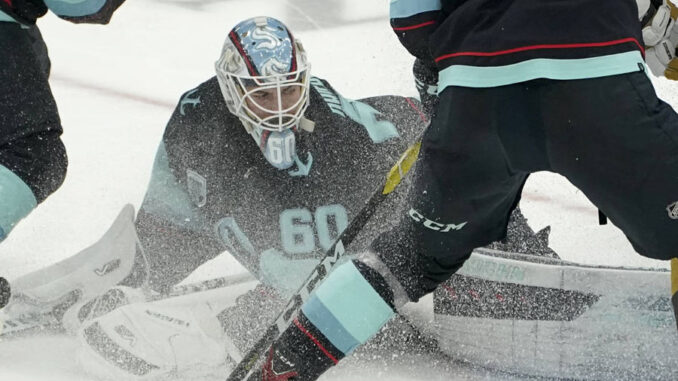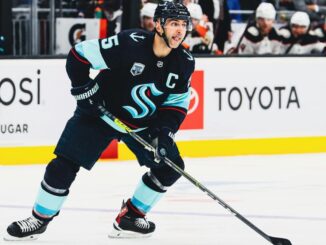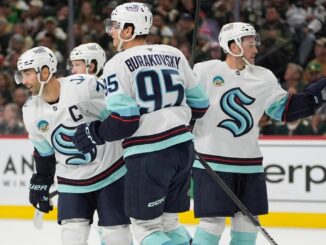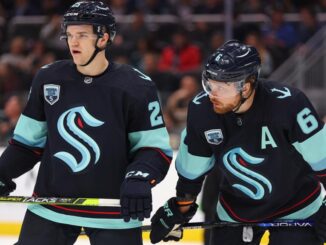
There’s no sugar-coating it – the Seattle Kraken trudged through an underwhelming inaugural season in which they finished 30th overall. Rather than being in the midst of a competitive playoff run, the newly-minted franchise is more concerned with which top prospect will be chosen to join the organization at the 2022 NHL Entry Draft.
Despite the massive disappointment that was the 2021-22 campaign, all hope is not lost. The four Eastern (Tampa Bay Lightning and New York Rangers) and Western Conference (Colorado Avalanche and Edmonton Oilers) finalists can be used as guides on how to build a legitimate Stanley Cup contender. So, let’s dig into four crucial lessons that the Kraken can incorporate into their roster-building strategies.
Lesson #1: Build Through the Draft
Apart from the Rangers – who still have Alexis Lafreniere (1st-overall in 2020) and Kaapo Kakko (2nd-overall in 2019) on the roster – each of the final four squads have high draft picks driving their success. A star is not a prerequisite for winning a Stanley Cup, but it becomes immensely more difficult to win the trophy without a true difference-maker or two.
Colorado can count on Nathan MacKinnon (1st-overall in 2013), Gabriel Landeskog (2nd-overall in 2011), and Cale Makar (4th-overall in 2017). The Lightning accumulated superstars in Steven Stamkos (1st-overall in 2008), Victor Hedman (2nd-overall in 2009), and Andrei Vasilevskiy (19th-overall in 2012). The pillars of the Oilers’ resurgence in Connor McDavid (1st-overall in 2015), Leon Draisaitl (3rd-overall in 2014), and Darnell Nurse (7th-overall in 2013) were all high first-round selections.
On top of those heralded prospects-turned-stars, most of the final four teams can count on a number of mid-to-late-round picks taking on key roles. Acquiring such talents through trade or free agency requires a boatload of assets, so bypassing that entirely is a more cost-effective option.
Lesson #2: Know When to Walk Away from Free Agents
In a salary cap environment, having cap space freed up is a significant advantage in roster-building. It provides organizations with greater flexibility and puts them in a position to pounce when highly sought-after free agents or trade targets hit the market.
A different but related point is to realize that handing out expensive, long-term contracts to any player (except for a prime-age star) is often a bad decision. Although the player might positively impact the ice, their contract value could outweigh the said benefit.
Related: 3 Main Priorities For Seattle Kraken Offseason
In recent seasons, the Avalanche (Brandon Saad and Philipp Grubauer) and Lightning (Blake Coleman and Barclay Goodrow) have seen significant pieces leave via free agency after their contracts expired. What each group found is that they could entirely or partially replace their value with much cheaper options on contracts with better long-term outlooks.
The introduction of the salary cap means that players are now scrutinized based on the surplus value (or lack thereof) that they bring to the roster. As has been demonstrated time and time again, handcuffing oneself with pricey deals based on nostalgia, emotional sentiment, and other factors not grounded in rational evaluations. Now, intangibles are not insignificant, but a myopic focus on their impact and presence can lead to some ineffective team-building decisions. Each player should have a price, and once it’s no longer feasible, it’s time to move on and spend more efficiently.
Lesson #3: Capitalize on Trade Opportunities
Although the Lightning are the current poster boys for impact deadline acquisitions, this lesson is more geared towards finding underrated players yet to blossom into renowned names. Such players might be miscast in their current role, are the victims playing in a difficult situation, are victims of a numbers game, or are coming off of a trying season.
Using this lens, the Avalanche are the model to emulate. They snatched top-pair defenseman Devon Toews from the New York Islanders for a pair of second-rounders after finding themselves in a cap crunch. They dealt from a position of strength (Tyson Barrie on defense) to obtain a top-six center in Nazem Kadri, his value diminished due to high-profile disciplinary issues. It’s one thing to make deals for well-known trade targets, but it’s another to capitalize on another team’s unexpected misfortunes.
Lesson #4: Be Patient
The fourth and final lesson is arguably the simplest but most frustrating to learn. Each of the four conference finalists had to wait to experience success to some degree, often falling short in increasingly antagonizing ways.
Prior to their upcoming trip to the Stanley Cup Final, the Avalanche were dumped at the second-round hurdle in three consecutive postseasons. Before the Lightning became the juggernaut looking to claim three Cups in a row, the current core fell flat multiple times, including one of the most embarrassing results in recent memory. Tampa Bay lost in a Cup Final (2015), two Conference Finals (2016 and 2018), and most famously, were swept by the Columbus Blue Jackets in 2019 after completing the best regular season in franchise history.
This year’s Conference Final run finally added to the Oilers’ tally of a single series win in the McDavid-Draisaitl era (since 2015-16). This version of the Rangers qualified for the playoffs once between 2016-17 and 2020-21, and that solitary appearance was a loss in the qualifying round.
The road to a Stanley Cup championship is fraught with perils. Even if an organization does everything right, success is not guaranteed. In a sport as defined by luck as hockey, getting as many kicks at the can is the only way to increase the likelihood of a title. In a league comprised of 32 franchises, only one team is crowned per season. The odds are that any given season will end in disappointment. Coming to terms with this statistical reality brings some rationality and logic into what can be emotional front-office discussions. Patience is a virtue, and few executives can count it as one of their own.
Will Francis and the Kraken Learn the Right Lessons?
Teams can be enticed to take shortcuts that may bring short-term success but are damaging in the long run. With only one season under their belts and lowered expectations after a miserable inaugural campaign, the Kraken have a ton of runway in navigating their future outlook. The question is, will they take the right lessons from their more successful counterparts, and who will be the one to lead them?




